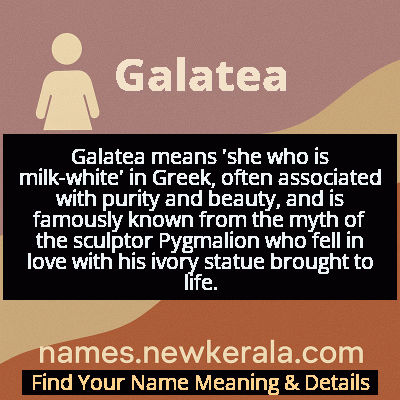Galatea Name Meaning & Details
Origin, Popularity, Numerology Analysis & Name Meaning of Galatea
Discover the origin, meaning, and cultural significance of the name GALATEA. Delve into its historical roots and explore the lasting impact it has had on communities and traditions.
Name
Galatea
Gender
Female
Origin
Greek
Lucky Number
2
Meaning of the Name - Galatea
Galatea means 'she who is milk-white' in Greek, often associated with purity and beauty, and is famously known from the myth of the sculptor Pygmalion who fell in love with his ivory statue brought to life.
Galatea - Complete Numerology Analysis
Your Numerology Number
Based on Pythagorean Numerology System
Ruling Planet
Moon
Positive Nature
Diplomatic, friendly, artistic, empathetic.
Negative Traits
Over-sensitive, moody, indecisive, prone to self-pity.
Lucky Colours
Green, cream, white.
Lucky Days
Monday.
Lucky Stones
Pearl, moonstone.
Harmony Numbers
1, 3, 4.
Best Suited Professions
Diplomats, mediators, caregivers, artists.
What People Like About You
Cooperative spirit, friendliness, artistic talent.
Famous People Named Galatea
Galatea of Cyprus
Ancient Greek courtesan
Renowned beauty and intellectual companion to Ptolemy I Soter
Galatea Ranzi
Italian actress
Celebrated film and theater performer with multiple awards
Galatea Ventouri
Greek pianist
Internationally recognized classical musician and composer
Name Variations & International Equivalents
Click on blue names to explore their detailed meanings. Gray names with will be available soon.
Cultural & Historical Significance
Extended Personality Analysis
Those bearing the name Galatea often embody a unique blend of artistic sensibility and ethereal presence. They typically possess a refined aesthetic sense and natural elegance that others find magnetic and inspiring. Like their mythological namesake, Galateas often undergo significant personal transformations throughout their lives, evolving from potential to actualization in remarkable ways. They tend to be highly intuitive and perceptive, with an ability to see beauty and possibility where others see only the ordinary. This visionary quality makes them excellent artists, healers, and innovators. However, their idealistic nature can sometimes lead to disappointment when reality fails to match their beautiful visions. Galateas are often deeply emotional and sensitive, requiring periods of solitude to recharge their creative energies. They possess a quiet strength and resilience that enables them to navigate life's challenges with grace. Their presence often has a calming, uplifting effect on others, much like the transformative power of art itself. Ultimately, Galateas represent the beautiful paradox of being both grounded and transcendent, practical and dreamy, human and somehow touched by the divine.
Modern Usage & Popularity
In contemporary naming practices, Galatea occupies a unique niche as a classical name that remains distinctive without being obscure. While it has never reached mainstream popularity, it maintains a steady presence among parents seeking names with deep cultural roots and artistic associations. The name sees occasional spikes in interest following cultural events, such as museum exhibitions featuring Galatea-themed art or new adaptations of the Pygmalion myth. In Greece, the name maintains stronger traditional usage, often given in honor of the mythological figure or family traditions. Among English-speaking countries, Galatea appeals particularly to educated, culturally aware parents who value classical education and artistic heritage. The name's rarity makes it an excellent choice for parents wanting something unique yet meaningful, with the added benefit of beautiful nickname possibilities like 'Lia,' 'Thea,' or 'Gala.' Recent years have seen a slight increase in usage as part of the broader trend toward mythological and classical names, though it remains well outside the top 1000 names in most regions.
Symbolic & Spiritual Meanings
Galatea embodies rich symbolic meanings that transcend her literal translation of 'white as milk.' She represents the ultimate transformation—from cold, inanimate ivory to warm, living flesh—making her a powerful symbol of rebirth, awakening, and the realization of potential. This metamorphosis speaks to the human capacity for change and growth, the idea that we all contain dormant possibilities waiting to be awakened by love, inspiration, or circumstance. Galatea symbolizes the perfect ideal made manifest, the abstract concept given form, and the creative power that bridges imagination and reality. In psychological terms, she represents the integration of different aspects of self—the perfect but static ideal learning to embrace messy, beautiful humanity. Her whiteness carries additional symbolism of purity, innocence, and new beginnings, while her transformation suggests that true beauty lies not in perfection but in vitality and authenticity. Galatea ultimately represents hope—the belief that love and vision can transform the ordinary into the extraordinary, and that we all contain the potential for miraculous change.

